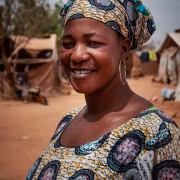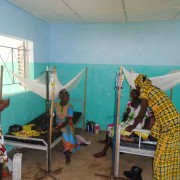Speeches Shim

When a village near Bankass, Mali, was attacked in March 2019, Hawa Minta opened her front yard to families displaced by the violence. She has been hosting between 120 and 190 people ever since. Hawa Minta was at home when she received the call. Her mother-in-law’s village in central Mali had been attacked by armed men and nearly 200 people were now on the run, looking for somewhere safe to hide. Hawa, an elementary school teacher living some 100 miles away near the town of Mopti, did not have much to offer, but she had a front yard. She felt compelled to help.

In Mamoudou Ongoiba’s community, men’s and women’s roles have always been different and well defined. Mamoudou is a farmer and the Village Savings and Loan Association (VSLA) promoter in the village of Fombori in Mali’s Mopti region. As one of 32 community members of the Oro Edjo VSLA, Mamoudou helps to organize around common objectives and takes an active role in ensuring activities are carried out as planned. These associations are generally composed of 20 to 35 women members. Associations define a set amount of money each woman will contribute according to an agreed schedule, in order to grant loans to one another. To date, the women of Fombori’s VSLA have been able to save $5,682 and issued loans allowing each member to start an income-generating activity such as animal breeding or marketing of horticulture products and cereals, or to meet urgent needs

If you thought education is expensive, try ignorance says a popular quote. Farmers in Mali whose parents could not afford to send them to school know this too well and they do not want history to repeat. Farmers like Timothée Goita says that if it was not for interventions that improved his economic status, he would not have been able to enroll his children in school or provide them three square meals a day. The farmer says that project interventions enabled him to double yields from improved varieties, gain access to storage facilities and avail timely credit through the warrantage system saving him from selling his harvest at throwaway prices during a glut.

The Koumantou community health center (CSCom) in Mali’s Sikasso region (southern Mali) was overcrowded, undersupplied, and inefficient—a significant risk to patients. Similar to the majority of CSComs in Mali, Koumantou could only diagnose and treat simple uncomplicated cases of malaria, as it did not have the space to hospitalize patients with severe malaria. Severe malaria cases had to be referred to the Bougouni district hospital.

Thanks to the community participation activities of the USAID/Mali SIRA project, the children of Bougoula are motivated to go to school. Bougoula is a village in Sanankoroba (Southern Mali). In the past, children in this community did not like school, and they were not encouraged by their parents to attend school. School dropout was very common.

Comment
Make a general inquiry or suggest an improvement.